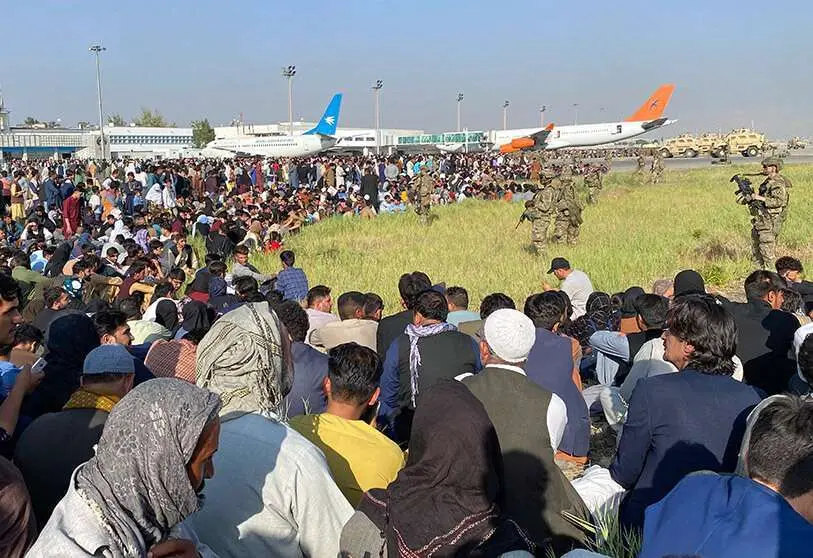Afghanistan, the Defeat of the West

Almost three decades ago, amidst the pomp and circumstance of the Barcelona Olympics, the Universal Exposition in Seville and the European Capital of Culture in Madrid, the publication of a short essay by Rafael Argullol and Eugenio Trías, one of the only Spanish philosophers of the last 50 years capable of creating an organic and original system of thought, went almost unnoticed. The book was called 'El cansancio de Occidente' (The Weariness of the West). In it, its authors pointed out that, embarrassed by the barbarism of the two world wars and numbed by the seemingly unfathomable welfare state, Western civilisation was in agony due to individualism, nihilism and hedonism.
That false security, derived from Western developmentalism and the axiological transformation of the 1960s, was shaken by the Iranian revolution of 1978, the Yugoslav wars of 1991-2001, the jihadism that began in 2001, the Chinese deployment since 2008 and American withdrawal since 2009, the Europeanist crisis of 2007-2016 (still ongoing) and the pandemic that began in 2020. As the philosopher Angelo Petroni also recently stated in 'Federalismi', our clock is ticking back to 1949, when the Atlanticist project began. The North American-European axis, despite the fall of communism in 1989, is currently at its lowest ebb.
It would take more space than prudence advises for this article to analyse its causes, which are the three basic ones warned of by Trías and Argullol. If we take them to a practical level, the West has built its political agenda on idealism, has let its middle classes fall, has confused individual and collective freedoms, has made an unrealistic calculation of the cost of the welfare system, has abandoned technological leadership and productive sovereignty, has prioritised particular interests over universal interests, and has transformed cooperation into a new form of colonialism. The result is plain to see: domestic populism and international irrelevance.
Afghanistan, the most paradigmatic case along with Yugoslavia, has been a double defeat for the West. First, it has left the incipient project of guaranteeing human rights in the country, devastated by the Russian (1979-1989) and American (2001-2014) invasions, to its fate. Secondly, it has failed to promote an inculturated model of democracy, limiting itself to imposing a Westernised model. As a result, democracy has been seen in Muslim countries as acculturation. This was the cause of the burning of the Rex cinema in Tehran in 1978, and it has also been at the root of the destabilisation of the Maghreb since 2010, with the so-called Arab Spring. Far from starting from the 'Falsafa' or 'Euro-Islam', which sought an autochthonous synthesis between freedoms and community, Western countries have wanted to bring there not a Greek model of democracy but an Anglo-French model, the same one that has already failed in the Middle East and the Far East, from Indochina to Vietnam. Indeed, the images of these days are sadly reminiscent of the fall of Saigon in 1975.
Jihadism is not a religious phenomenon but a cultural one. It is a by-product of fundamentalism. It stems from a rigorist interpretation of Islam resulting from the rejection of modernity understood as a way of life based, on the one hand, on the three counter-values that Trías and Argullol had already warned were harmful to the West and, on the other, on the maintenance of the prerogatives of a ruling class, the warlords, which some multinationals (and states) have taken over in order to continue acquiring natural resources without generating shared wealth. Obviously, not everything is excusable: this fundamentalism, as opposed to the process of 'ijtihād', of hermeneutics, is a denial of individual freedoms, with all that this entails in terms of imposing lifestyles and limiting personal habits. This is intolerable.
Nothing is achieved all at once. Revolutions have always brought violence and suffering. Everything must be the product of a process of dialogue between human rights and cultural substrata, with clear red lines. In this process, the media, like the education systems, should have played an essential role. A country cannot be transformed by military means alone, but it is essential to create the conditions for peace in which politics, education, the economy and communication can act. The political decision to abandon those who were initiating it to their fate now is not only a disloyalty to them but a failure: the failure of the West, from the United States to the European Union. Sadly, beneath the cobblestones of the streets of Paris, there was no beach but a whirlpool. Those who will now drown in it are those who are unable to board the last plane to take off from Kabul airport.
Sergi Rodríguez López-Ros, Vice Rector of the Universitat Abat Oliba CEU in Barcelona/The Diplomat.
